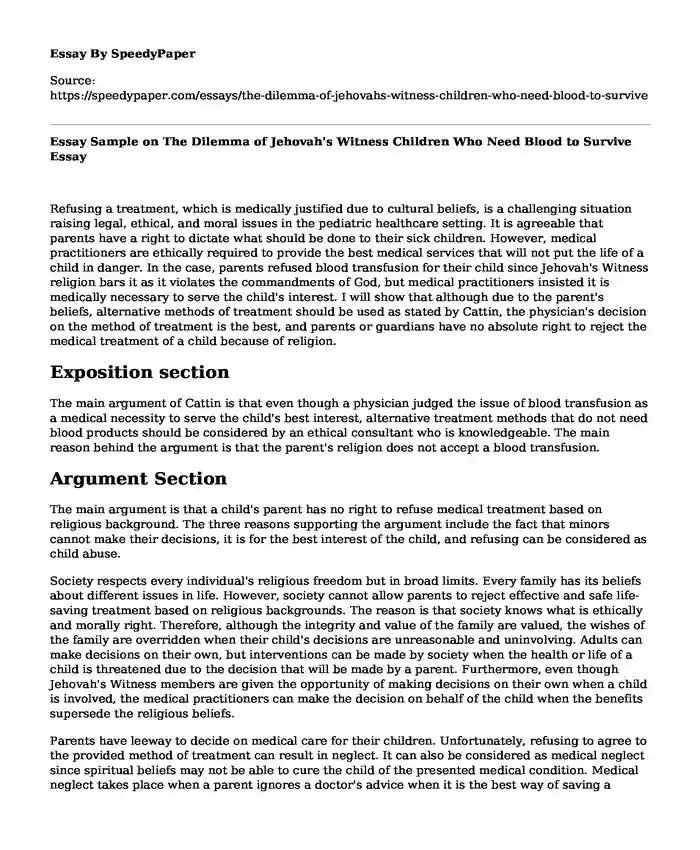
| Type of paper: | Term paper |
| Categories: | Religion Healthcare Ethical dilemma |
| Pages: | 3 |
| Wordcount: | 797 words |
Refusing a treatment, which is medically justified due to cultural beliefs, is a challenging situation raising legal, ethical, and moral issues in the pediatric healthcare setting. It is agreeable that parents have a right to dictate what should be done to their sick children. However, medical practitioners are ethically required to provide the best medical services that will not put the life of a child in danger. In the case, parents refused blood transfusion for their child since Jehovah's Witness religion bars it as it violates the commandments of God, but medical practitioners insisted it is medically necessary to serve the child's interest. I will show that although due to the parent's beliefs, alternative methods of treatment should be used as stated by Cattin, the physician's decision on the method of treatment is the best, and parents or guardians have no absolute right to reject the medical treatment of a child because of religion.
Exposition section
The main argument of Cattin is that even though a physician judged the issue of blood transfusion as a medical necessity to serve the child's best interest, alternative treatment methods that do not need blood products should be considered by an ethical consultant who is knowledgeable. The main reason behind the argument is that the parent's religion does not accept a blood transfusion.
Argument Section
The main argument is that a child's parent has no right to refuse medical treatment based on religious background. The three reasons supporting the argument include the fact that minors cannot make their decisions, it is for the best interest of the child, and refusing can be considered as child abuse.
Society respects every individual's religious freedom but in broad limits. Every family has its beliefs about different issues in life. However, society cannot allow parents to reject effective and safe life-saving treatment based on religious backgrounds. The reason is that society knows what is ethically and morally right. Therefore, although the integrity and value of the family are valued, the wishes of the family are overridden when their child's decisions are unreasonable and uninvolving. Adults can make decisions on their own, but interventions can be made by society when the health or life of a child is threatened due to the decision that will be made by a parent. Furthermore, even though Jehovah's Witness members are given the opportunity of making decisions on their own when a child is involved, the medical practitioners can make the decision on behalf of the child when the benefits supersede the religious beliefs.
Parents have leeway to decide on medical care for their children. Unfortunately, refusing to agree to the provided method of treatment can result in neglect. It can also be considered as medical neglect since spiritual beliefs may not be able to cure the child of the presented medical condition. Medical neglect takes place when a parent ignores a doctor's advice when it is the best way of saving a child's life. Thus, it is not ethically right for a parent to sacrifice his or her child when life excellent treatment method is available regardless of the reason.
The best interest is considered as the act of promoting the maximum good of a person. A subjective standard usually relies on wishes on competent people to make decisions on behalf of others, but it is not applicable to children. Although defining the best interest of a child is difficult, the surrogate should make a decision that is most favorable to a child. For instance, in this case, blood transfusion is considered as the best decision not to jeopardize the life of a child. The harm principle is applicable in this case because the parents can cause harm to their children for refusing blood transfusion ideas on their behalf.
Making a blood transfusion for a minor is in his or her best interest. Life can be saved if the blood transfusion process becomes successful, and it is the best way of taking a child out of danger. It is the doctor who knows the patient's best interest in their children. It means that parents are not supposed to deprive their children of life as the decision may result in death. When a child dies, can that be considered his or her best interest because the parents rejected the issue of blood transfusion? The principle of legal moralism, it states that a legitimate responsibility of the law is enforcing morality by excluding the practices regarded as immoral. It means that the best ethical decision in the case is carrying out the process since the doctor is more experienced and knows the best decision cannot jeopardize a child. Although parents also have the right to make decisions, they are not medically experienced to know when their child's life is in danger.
Cite this page
Essay Sample on The Dilemma of Jehovah's Witness Children Who Need Blood to Survive. (2023, Apr 09). Retrieved from https://speedypaper.net/essays/the-dilemma-of-jehovahs-witness-children-who-need-blood-to-survive
Request Removal
If you are the original author of this essay and no longer wish to have it published on the SpeedyPaper website, please click below to request its removal:
- Reflective Essay Sample on Developing Professional Nursing in Singapore
- Medicare Essay Sample
- The Nature of Perception, Marketing Essay Example
- Young Goodman Brown - Nathaniel Hawthorne Essay Example
- Essay Sample about the Stage of Pre-production in Film Making
- Essay Example on Current Technology Issues
- Paper Example. Sermon on the Mount
Popular categories




